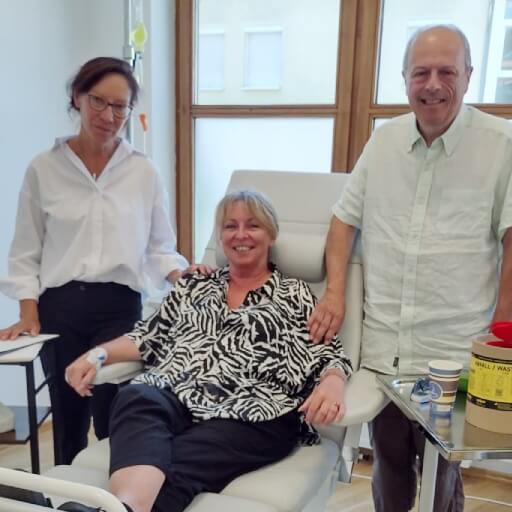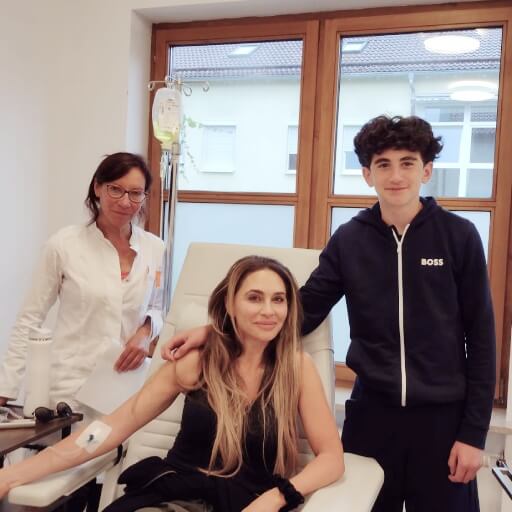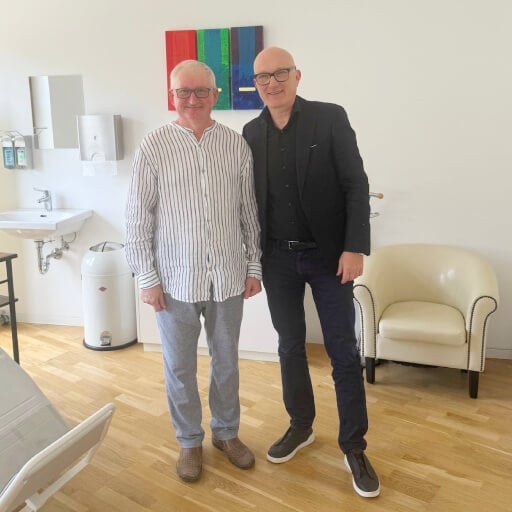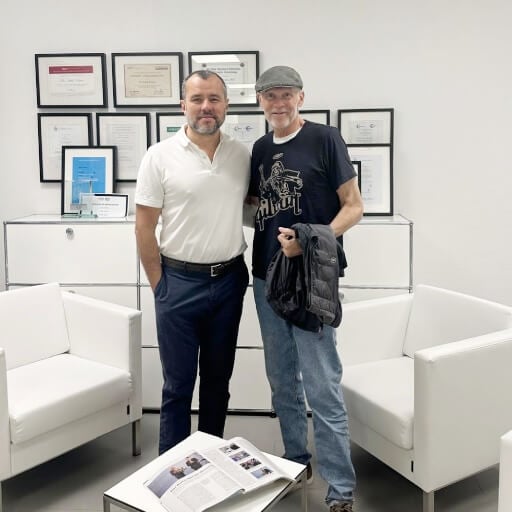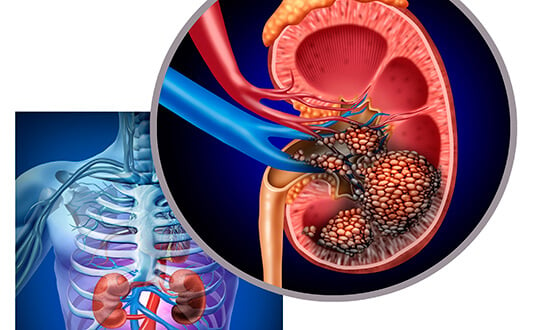يُشكل سرطان الخلايا الكلوية أو السرطانة الخلوية الكلوية (RCC) ما يقرب من 90٪ من جميع سرطانات الكلى ويظل واحداً من أكثر عشرة سرطانات شيوعاً في جميع أنحاء العالم. في عام 2022 وحده، تم تشخيص أكثر من 435.000 حالة جديدة على مستوى العالم، مع أكثر من 156.000 حالة وفاة منسوبة إلى المرض [1]. زاد معدل الإصابة بشكل مُطرد، وخاصةً في البلدان ذات الدخل المرتفع، ويرجع ذلك جزئياً إلى الفحص واسع النطاق وعوامل الخطر المرتبطة بأسلوب الحياة.
في حين تظل الجراحة حجر الزاوية للأورام الموضعية، إلا أن نتائج سرطان الخلايا الكلوية النقيلي لا تزال دون المستوى الأمثل، حيث تتراوح معدلات البقاء على قيد الحياة لمدة خمس سنوات حول 15٪ في المراحل المتقدمة [2]. العلاجات الجهازية القياسية، بما في ذلك العوامل الموجهة ومثبطات نقاط التفتيش المناعية، أدت إلى تحسين النتائج، لكن العديد من المرضى لا يزالون يشهدون تَقدُم أو انتكاس، مما يستدعي الحاجة إلى المزيد من علاجات سرطان الكلى المبتكرة.
في هذا المشهد العلاجي المتطور، برز العلاج بالخلايا المتغصنة (DC) كنهج واعد للعلاج المناعي الشخصي. على عكس العلاجات التقليدية، يعمل العلاج بالخلايا المتغصنة على تدريب جهاز المناعة للتعرف على المستضدات الخاصة بالورم والقضاء عليها، مما يوفر أملاً جديداً للمرضى الذين يعانون من سرطان الخلايا الكلوية المقاوم أو المتكرر.
ما هو سرطان الخلايا الكلوية (RCC)؟
سرطان الخلايا الكلوية البشرية هو النوع الأكثر شيوعاً من سرطان الكلى، والذي ينشأ في بطانة الأنابيب الصغيرة (الأنابيب الكلوية) التي تقوم بترشيح الدم وإنتاج البول. يتم تشخيص المرض في أغلب الأحيان لدى البالغين الذين تتراوح أعمارهم بين 60 و 70 عاماً، حيث تكون خلايا RCC الواضحة هي النمط الفرعي النسيجي السائد. تشمل الأشكال الأخرى الأقل شيوعاً سرطان الخلايا الكلوية الحليمي وسرطان الخلايا الكلوية الكروموفوبية (الكاره للون)، ولكل منهما سلوك بيولوجي وتوقعات مميزة.
هناك عدة عوامل قد تُزيد من خطر تطور سرطان الخلايا الكلوية، بما في ذلك التدخين، والسمنة، وارتفاع ضغط الدم المزمن، وغسيل الكلى لفترات طويلة. كما تساهم الحالات الوراثية، مثل متلازمة فون هيبل-لينداو (VHL)، في نسبة صغيرة من الحالات.
يتم تحديد مرحلة سرطان الخلايا الكلوية باستخدام نظام TNM، الذي يأخذ في الاعتبار حجم ومدى الورم الأولي (T)، وانتشاره إلى العقد اللمفاوية القريبة (N)، ووجود نقائل بعيدة (M):
- المرحلة الأولى: الورم مقتصر على الكلى ويكون أقل من 7 سم
- المرحلة الثانية: حجم الورم أكبر من 7 سم ولكنه لا يزال متموضعاً داخل الكلى
- المرحلة الثالثة: انتشر السرطان إلى العقد اللمفاوية القريبة أو الأوعية الدموية الكبرى
- المرحلة الرابعة: انتشر السرطان إلى أعضاء بعيدة، مثل الرئتين، والعظام، والكبد
غالباً لا يكون للمرحلة المبكرة من سرطان الخلايا الكلوية أي أعراض ويتم اكتشافه في كثير من الأحيان عن طريق الصدفة أثناء التصوير. مع تقدُم المرض، قد يشهد المرضى وجود دم في البول، وألم مستمر في الخاصرة، وتعب، وفقدان الوزن، أو وجود كتلة ملموسة في البطن. يتضمن التشخيص عادةً إجراء التصوير المقطعي المحوسب أو التصوير بالرنين المغناطيسي، مع استخدام الخزعة في حالات مختارة لتأكيد النوع الفرعي للورم.
خيارات العلاج التقليدية لسرطان الخلايا الكلوية RCC
تعتمد استراتيجيات علاج سرطان الخلايا الكلوية RCC على مرحلة المرض، والصحة العامة للمريض، والخصائص النسيجية والجزيئية للورم. العلاج الشخصي، المُصمم من خلال التعاون متعدد التخصصات، يُقدم أفضل فرصة للسيطرة على المرض على المدى الطويل.
استئصال الكلية الجزئي والجذري
تُعتبر الجراحة المعيار الذهبي لسرطان الخلايا الكلوية الموضعي وغالباً ما تكون شافية عند اكتشاف السرطان مبكراً. اعتماداً على حجم وموقع الورم، قد يوصي الجراحون إما باستئصال الكلية الجزئي، حيث يتم إزالة الورم فقط وهامش صغيرة من الأنسجة السليمة، أو استئصال الكلية الجذري، والذي يتضمن إزالة الكلية بأكملها مع الدهون المحيطة بها، وأحياناً الغدة الكظرية أو العقد اللمفاوية القريبة.
الطرق طفيفة التوغل مثل جراحة التنظير البطني laparoscopic أو الجراحة بمساعدة الروبوت Robotic-assisted surgery، تُستخدم الآن على نطاق واسع للحفاظ على وظائف الأعضاء مع تقليل وقت التعافي والخطر الجراحي. في سرطان الخلايا الكلوية المتقدم، قد يكون للجراحة وظيفة حاسمة ضمن خطة العلاج المشتركة، وخاصةً لتقليل عبء الورم قبل العلاج الجهازي.
العلاجات الموجهة: حجب مسارات نمو الورم
بالنسبة للمرضى المصابون بسرطان الخلايا الكلوية المتقدم أو النقيلي، غالباً ما يكون العلاج الموجه خيار جهازي أساسي. تم تصميم هذه الأدوية للتدخل في جزيئات محددة تعتمد عليها الأورام للنمو والانتشار، وخاصة تلك التي تشارك في تولد الأوعية الدموية (تَكوّن الأوعية الدموية) والإشارات الخلوية.
يمكن للعوامل الخاصة أن تُبطئ تقدُم المرض، وفي بعض الحالات، تُقلص الأورام. ومع ذلك، فإن العلاجات الموجهة ليست شافية وغالباً ما يتم دمجها مع وسائل أخرى لتحقيق أقصى قدر من الفعالية وتأخير المقاومة.
العلاج الكيميائي والإشعاع
على عكس العديد من السرطانات الأخرى، فإن سرطان الخلايا الكلوية (سرطانة الخلايا الكلوية) عادةً ما يكون مقاوماً للعلاج الكيميائي التقليدي. ونتيجة لذلك، نادراً ما يتم استخدام الأدوية السامة للخلايا كعلاج أساسي ويتم النظر فيها في الغالب عندما تفشل جميع الخيارات الأخرى. وبالمثل، يلعب العلاج الإشعاعي دوراً محدوداً في سرطان الخلايا الكلوية نظراً لانخفاض حساسية الورم للإشعاع.
ومع ذلك، قد يتم استخدام الإشعاع بشكل تلطيفي لتخفيف الأعراض مثل آلام العظام أو انضغاط الحبل الشوكي الناجم عن النقائل. في حالات نادرة، قد يتم استخدامه أيضاً بعد الجراحة للسيطرة على التكرار الموضعي.
ما هو العلاج بالخلايا المتغصنة؟
العلاج القائم على الخلايا المتغصنة Dendritic cell-based therapy هو أحد أشكال العلاج المناعي للسرطان الشخصي الذي يهدف إلى إعادة تعليم الجهاز المناعي للتعرف على الخلايا الخبيثة وتدميرها. على عكس العلاجات التي تهاجم الأورام مباشرةً، تعمل هذه الطريقة عن طريق تضخيم الاستجابات المناعية للجسم - استهداف جذر التهرُب المناعي الذي يعتمد عليه السرطان في كثير من الأحيان للبقاء على قيد الحياة.
كان هذا الاكتشاف مهماً جداً لدرجة أن رالف ستاينمان حصل على جائزة نوبل في علم وظائف الأعضاء أو الطب في عام 2011 لاكتشافه الخلايا المتغصنة Dendritic cells وإثبات كيف تساعد جهاز المناعة في مكافحة المرض [3].
كيف تُحفّز الخلايا المتغصنة المناعة المضادة للورم؟
غالباً ما يُشار إلى الخلايا المتغصنة DCs باسم "الحراس" لجهاز المناعة. يتمثل دورها الرئيسي في التقاط المستضدات — البروتينات الموجودة في مُسببات المرض أو الخلايا غير الطبيعية — وتقديمها إلى الخلايا التائية T-cells، وهم المقاتلون الرئيسيون لجهاز المناعة. في سياق العلاج المناعي للسرطان، يتم عزل الخلايا المتغصنة (الخلايا الشجيرية) من دم المريض، وتحميلها بمستضدات مرتبطة بالورم في المختبر، ثم إعادة إدخالها إلى الجسم.
بمجرد إعادة حقنها، تهاجر هذه الخلايا المتغصنة المحملة بالمستضد إلى العقد اللمفاوية، حيث تتفاعل مع الخلايا التائية غير الناضجة وتُحفز استجابة مناعية موجهة. بعد ذلك، يمكن للخلايا التائية المُنشَّطة أن تنتشر في الجسم، باحثةً عن خلايا الورم التي تُعبِّر عن نفس المستضدات وتدمرها. تُحوِّل هذه العملية الورم من "غير مرئي" لجهاز المناعة إلى هدف نشط.
ما الذي يجعل العلاج بالخلايا المتغصنة مختلفاً عن العلاجات المناعية الأخرى؟
على عكس مثبطات نقاط التفتيش، التي تُطلق المكابح على نشاط الخلايا التائية الموجود، أو العلاج بالخلايا التائية CAR T-cell، الذي يعمل على تعديل الخلايا التائية نفسها، يركز العلاج القائم على الخلايا المتغصنة على الخطوة الأولية من تنشيط المناعة. فهو يُعيد بناء مسار التواصل بين المناعة الفطرية والمناعة المكتسبة، مما يُساعد الجسم على التعرف على الأورام التي قد يتجاهلها لولا ذلك.
كما أن العلاج بالخلايا المتغصنة هو علاج فردي للغاية. المستضدات المُستخدمة في "تعليم" الخلايا المتغصنة مشتقة في أغلب الأحيان من مادة الورم الخاصة بالمريض نفسه، وهو ما يُضيف طبقة إضافية من الدقة. يُقلل هذا التصميم المُخصص من خطر التأثيرات غير الموجهة ويمكن أن يُحسن فرص تحفيز الذاكرة المناعية طويلة المدى ضد السرطان.
تُعتبر الخلايا المتغصنة (الخلايا الشجيرية) أيضاً لاعبين نشطين في البيئة الميكروية المحيطة بالورم نفسه. وقد أظهر الفحص المجهري عالي الدقة بوضوح أن الخلايا المتغصنة DCs / الخلايا الشجيرية DCs الناضجة قادرة على التسلل جسدياً إلى أنسجة الورم، وتشكيل اتصال وثيق مع الخلايا الخبيثة، وتشكيل السياق المناعي الموضعي.
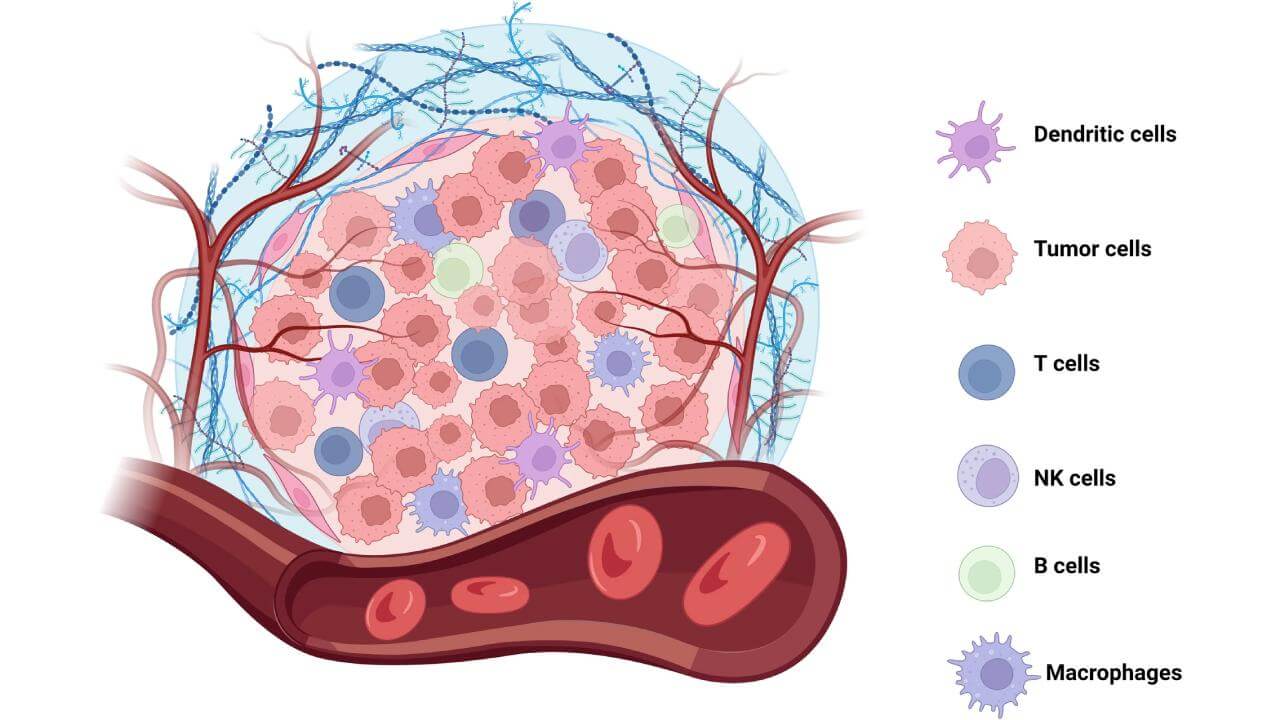
العلاج بالخلايا المتغصنة لسرطان الخلايا الكلوية RCC
يبرُز العلاج بالخلايا المتغصنة كأحد أكثر استراتيجيات العلاج المناعي الواعدة لعلاج سرطان الخلايا الكلوية البشرية، وخاصةً لدى المرضى الذين يعانون من مرض متقدم أو متكرر. على الرغم من أن سرطان الخلايا الكلوية يُعتبر منذ فترة طويلة مقاوم للعلاج الكيميائي التقليدي، إلا أنه أظهر استجابة مُشجعة للعلاجات القائمة على المناعة، وخاصةً عندما تكون هذه العلاجات مخصصة ومحددة للورم.
النتائج السريرية والأدلة المتزايدة
أظهر عدد متزايد من الدراسات السريرية أن لقاحات الخلايا المتغصنة يمكن أن تعمل على تنشيط مناعة قوية ومستدامة مضادة للورم لدى المرضى المصابين بسرطان الخلايا الكلوية RCC. أظهر المرضى الذين يتلقون العلاج بالخلايا المتغصنة لسرطان الخلايا الكلوية النقيلي (العلاج بالخلايا الشجيرية لسرطان الخلايا الكلوية النقيلي) تفاعل مناعي مُحسن، وتباطؤ في تقدُم المرض، وبقاء على قيد الحياة مُطول. ترجع هذه الفعالية جزئياً إلى حقيقة أن سرطان الخلايا الكلوية يُحفز نشاط الخلايا المتغصنة داخل البيئة الميكروية للورم، والتي يعمل العلاج بالخلايا المتغصنة على تضخيمها لإنشاء ذاكرة مناعية دائمة — وهو أمر بالغ الأهمية لإدارة الانتكاسات المتأخرة والنقائل البعيدة.
هذه الملاحظات السريرية مدعومة بفهم مُفصل لكيفية إنتاج وتوصيل لقاحات الخلايا المتغصنة. في كثير من الحالات، تبدأ عملية العلاج بعد إزالة الورم جراحياً، حيث تتم معالجة مادة الورم في صورة حلالة تُستخدم لتحميل الخلايا المتغصنة Autologous dendritic cells الذاتية. هذا المنطق العلاجي — الانتقال من الاستئصال الجراحي إلى تنشيط المناعة الشخصية — ينعكس بشكل متزايد في تصميم التجارب الحديثة.
تُعتبر الخزعة السائلة طريقة أفضل حتى للحصول على مستضدات الورم لأنها تجمع الخلايا ذات الطفرات الحديثة. في هذه الحالة، يحصل الأطباء على خلايا السرطان من الدم، لذلك لا توجد حاجة إلى مواد الورم بعد العملية.
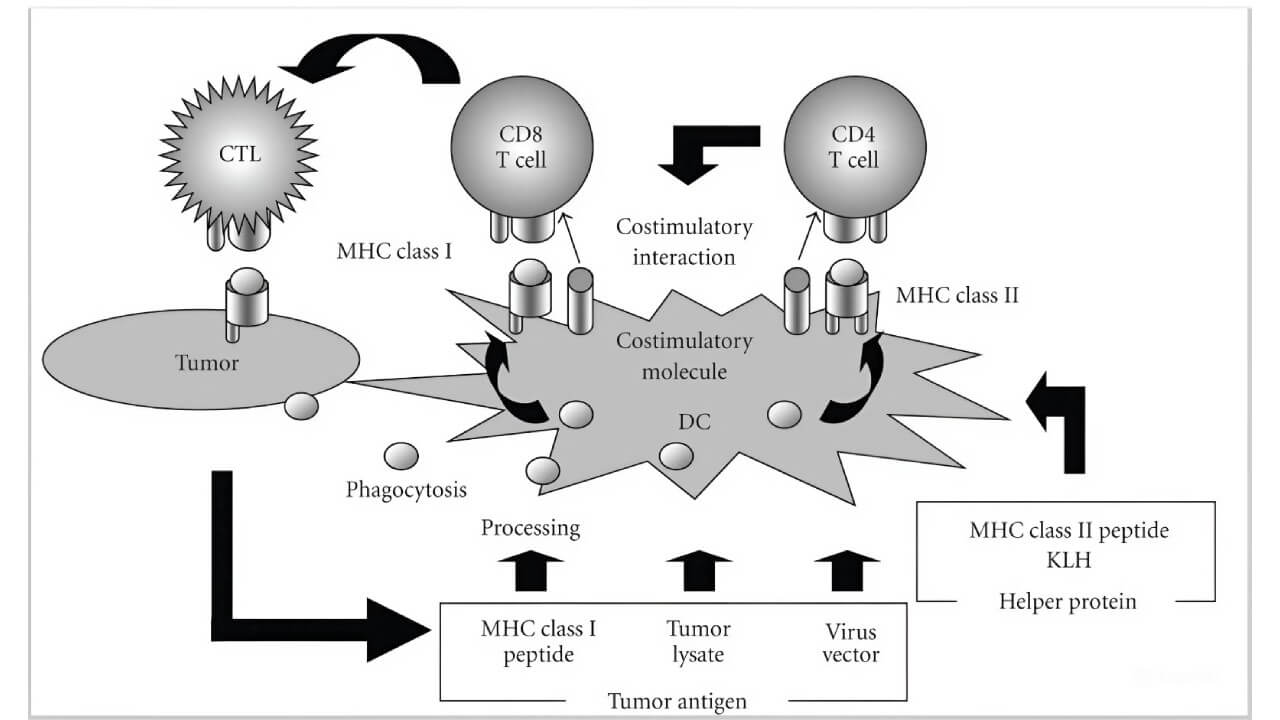
فوائد للمرضى الذين يعانون من مرض متكرر أو نقيلي
تمثل الخلايا الشجيرية لعلاج RCC النقيلي خياراً قيماً لعلاج المرضى الذين يواجهون الانتكاس أو المرض المتقدم. عندما تُصبح العلاجات التقليدية أقل فعالية أو قاسية للغاية، توفر اللقاحات المتغصنة لسرطان الكلى بديلاً أكثر أماناً وجيد التحمل يمكنه تعزيز جهاز المناعة — حتى في المرضى الذين خضعوا بالفعل لعلاجات متعددة.
تقترح النتائج السريرية أن العلاج بالخلايا المتغصنة يمكن أن يساعد في تأخير التقدُم، وإطالة الفترات الخالية من المرض، وفي بعض الحالات حتى تقليل عبء الورم. بالنسبة لـ المرضى المصابين بسرطان الخلايا الكلوية النقيلي، يوفر هذا النهج طريقة لإشراك الجهاز المناعي بشكلٍ مباشر - وتحويل المراقبة السلبية إلى مقاومة نشطة.
التكامل مع الجراحة والعلاجات المناعية الأخرى
يكون العلاج بالخلايا المتغصنة أكثر فعالية عند دمجه مع استراتيجية علاجية أوسع. على سبيل المثال، يؤدي إجراء استئصال الكلية قبل التطعيم إلى تقليل الحمل الكابت للمناعة وتوفير أنسجة الورم القيمة لإعداد المستضد. كما أن التوقيت عاملٌ أساسي: إعطاء اللقاح بعد الجراحة بفترة وجيزة أو بالاشتراك مع مثبطات نقاط التفتيش يمكن أن يُساعد في تعظيم تنشيط المناعة والحفاظ على استجابات الخلايا التائية T-cell.
في الواقع، يتم حالياً استكشاف الجمع بين العلاج بالخلايا المتغصنة مع إحصار PD-1 أو CTLA-4 في العديد من الأماكن السريرية كعلاجات مبتكرة لسرطان الكلى. تهدف هذه التركيبات إلى تعزيز كلا من بدء واستمرار المناعة المضادة للورم - معالجة اثنين من التحديات الرئيسية في رعاية سرطان الخلايا الكلوية المتقدم.
| السِمة | الأساليب القياسية | العلاج بالخلايا المتغصنة |
|---|---|---|
| معدل البقاء على قيد الحياة لمدة عامين | ~25–٪35 للحالات المنتكسة/المقاومة للعلاج | ما يصل إلى 60٪ في مرضى مختارين |
| معدل الاستجابة | أقل من 10–20٪ من الاستجابات المتينة في المرض المتقدم | 45–٪65 من تنشيط الخلايا التائية المُوَثق وسيطرة مناعية |
| الآثار الجانبية | سُمية جهازية شديدة (غثيان، وتعب، ونقص الخلايا المتعادلة، وعدوى) | خفيفة في الغالب (احمرار موضعي، وحُمى، وتعب لمدة 24-48 ساعة) |
العلاج القائم على الخلايا المتغصنة في ألمانيا
أصبحت ألمانيا واحدة من الوجهات الأكثر ثقة في أوروبا للمرضى الذين يبحثون عن علاجات سرطان الكلى المبتكرة — خاصةً عندما يتعلق الأمر بالعلاج المناعي الشخصي. بالنسبة للأفراد الذين تم تشخيص إصابتهم بسرطان الخلايا الكلوية، فإن العلاج القائم على الخلايا المتغصنة Dendritic cell-based therapy المُقدم في المستشفيات الألمانية هو أكثر من مجرد بديل؛ فغالباً ما يُنظر إليه على أنه الخطوة الاستراتيجية التالية بعد استنفاذ العلاجات القياسية أو عندما لم تعد الجراحة والأدوية الجهازية كافية.
أحد الأسباب التي تجعل المرضى يختارون علاج سرطان الكلى في ألمانيا هو النهج التنظيمي الصارم الذي تتبعه البلد فيما يتعلق بالعلاجات القائمة على الخلايا. يتم إنتاج اللقاحات المتغصنة لسرطان الكلى في مختبرات معتمدة من قبل GMP بموجب بروتوكولات سريرية خاضعة للرقابة. هذا يعني أن كل مرحلة من مراحل العملية — بدءاً من عزل الخلايا المناعية الأولية ووصولاً إلى تحميل المستضد والإعطاء النهائي — مضمونة الجودة وموثقة. يُعد هذا الاهتمام بالتفاصيل ضرورياً عند التعامل مع العلاجات الشخصية حيث تؤثر السلامة والدقة على النتيجة بشكلٍ مباشر.
تستخدم المستشفيات في ألمانيا الرائدة الخلايا المتغصنة الذاتية التي يتم جمعها من دم المريض نفسه، وتدريبها بعد ذلك للتعرف على المستضدات الخاصة بالورم. يتم دمج هذه اللقاحات المُصممة خصيصاً في خطط علاج أوسع نطاقاً قد تشمل الجراحة، أو مثبطات نقاط التفتيش المناعية، أو العلاجات الموجهة. نادراً ما يتوفر هذا النوع من النهج المُركّب في معظم البلدان، ولكنه ممارسة شائعة في المستشفيات الألمانية، تُدار من خلال مجالس الأورام متعددة التخصصات، ومراقبة المناعة في الوقت الفعلي.
سبب مهم آخر يجعل المرضى الدوليين يبحثون عن العلاج المناعي لسرطان الخلايا الكلوية في ألمانيا وهو إمكانية الوصول إلى أخصائيي الأورام المناعية ذوي الخبرة الذين شاركوا في أبحاث الخلايا المتغصنة منذ أوائل العقد الأول من القرن الحادي والعشرين. تم تطوير العديد من البروتوكولات المُستخدمة حالياً من خلال العمل التعاوني بين المستشفيات الجامعية الألمانية ومعاهد التكنولوجيا البيولوجية، مما يُتيح للمرضى الوصول إلى أحدث العلوم في بيئة سريرية.
| تكلفة العلاج | الأساليب القياسية | العلاج القائم على الخلايا المتغصنة |
|---|---|---|
| سعر العلاج في ألمانيا | 25.000 $ - 280.000 $ للدورة الكاملة | 20.000 $ - 38.000 $ للدورة الكاملة |
| سعر العلاج في المملكة المتحدة | 26.000 $ - 320.000 $ للدورة الكاملة | غير متوفر |
| سعر العلاج في الولايات المتحدة الأمريكية | 100.000 $ - 350.000 $ للدورة الكاملة | توفر محدود، ويُقدر بـ 100.000 $ - 150.000 $ |
كيف تحصل على العلاج في ألمانيا
قد يبدو التخطيط لعلاج سرطان الكلى الطبي في ألمانيا أمراً مُرهقاً في البداية، خاصةً عندما يتعلق الأمر بعلاجات السرطان المتقدمة مثل التطعيم بالخلايا المتغصنة. لكن بمساعدة Booking Health، تُصبح العملية سلسة، وآمنة، وشفافة تماماً — بغض النظر عن المكان الذي تأتي منه.
Booking Health هي منصة تنسيق طبي معتمدة دولياً تساعد المرضى في الوصول إلى العلاج المناعي المتخصص لسرطان الخلايا الكلوية RCC في ألمانيا، بما في ذلك العلاج بالخلايا المتغصنة المصمم لكل حالة. بمجرد تقديم طلبك، سيقوم مستشار طبي بمراجعة حالتك ومطابقتك مع المستشفيات الرائدة في ألمانيا والتي تتمتع بالخبرة في علاج الأورام المناعية. هذا يجعل Booking Health أحد الشركاء الأكثر ثقة لأولئك الذين يبحثون عن العلاج المناعي للسرطان في الخارج بجودة وأمان.
تتولى المنظمة كل شيء: ترجمة وثائقك الطبية، والتنسيق المباشر مع الأطباء، وجدولة المواعيد، والمساعدة في الحصول على التأشيرات الطبية، وحجز فندق والانتقالات من المطار، ودعمك طوال فترة إقامتك. يتم اختيار كل مستشفى ألماني تتعاون معها المنظمة بناءً على خبرتها في علاج سرطان الكلى وامتثالها لمعايير الجودة الدولية.
بالنسبة للعديد من المرضى الدوليين، وخاصةً أولئك الذين يبحثون عن علاجات شخصية غير متوفرة في بلدهم الأصلي، فإن العمل من خلال Booking Health هو الطريقة الأكثر فعالية للوصول إلى علاج سرطان الكلى المتطور في ألمانيا. من خلال اختيارك هذه الخدمة، يمكنك الاستفادة من الوصول المباشر إلى أفضل المتخصصين في العلاج المناعي للسرطان في الخارج، مما يضمن عملية منظمة وموجهة طبياً ذات قيمة سريرية حقيقية وراءها.
رحلة طبية: كل خطوة على الطريق مع Booking Health
يُعدّ إيجاد أفضل استراتيجية علاج لحالتك السريرية مهمةً صعبة. كونك مُرهق بالفعل من جلسات العلاج المتعددة، واستشارة العديد من المتخصصين، وتجربة مختلف التدخلات العلاجية، قد تجد نفسك في حيرة من أمرك بسبب المعلومات التي يقدمها الأطباء لك. في مثل هذه الحالة، من السهل اختيار خيار العلاج المباشر أو اتباع بروتوكولات علاجية موحدة ذات قائمة طويلة من الآثار السلبية بدلاً من اختيار خيارات العلاج المبتكرة المتخصصة للغاية.
لاتخاذ قرار مستنير والحصول على خطة مخصصة لإدارة السرطان، والتي سيتم تصميمها لتناسب حالتك السريرية المحددة، استشر الخبراء الطبيين في Booking Health. نظراً لكونها في الطليعة في تقديم أحدث الابتكارات الطبية لـ 12 عاماً بالفعل، تتمتع Booking Health بخبرة قوية في إنشاء برامج معقدة لإدارة السرطان في كل حالة فردية. كشركة مرموقة، تُقدم Booking Health خطط علاج سرطان الخلايا الكلوية الشخصية مع حجز مباشر للمستشفى ودعم كامل في كل مرحلة، بدءاً من العمليات التنظيمية ووصولاً إلى المساعدة أثناء العلاج. نحن نُقدم:
- تقييم وتحليل التقارير الطبية
- تطوير برنامج الرعاية الطبية
- اختيار موقع العلاج المناسب
- إعداد الوثائق الطبية وإرسالها إلى المستشفى المناسب
- الاستشارات التحضيرية مع الأطباء لتطوير برامج الرعاية الطبية
- نصائح الخبراء أثناء الإقامة في المستشفى
- رعاية المتابعة بعد عودة المريض إلى بلده الأصلي بعد إكمال برنامج الرعاية الطبية
- الاهتمام بالإجراءات الرسمية كجزء من التحضير لبرنامج الرعاية الطبية
- تنسيق وتنظيم إقامة المريض في بلد أجنبي
- المساعدة في الحصول على التأشيرات وتذاكر الطيران
- مُنسق شخصي ومترجم فوري مع دعم على مدار الساعة 24/7
- ميزانية شفافة بدون تكاليف خفية
الصحة جانبٌ لا يُقدّر بثمن في حياتنا. ينبغي تفويض إدارة شيء هش وثمين فقط إلى خبراء يتمتعون بخبرة مُثبتة وسمعة طيبة. Booking Health هو شريك جدير بالثقة يساعدك على طريق الحصول على صحة أقوى وجودة حياة أفضل. اتصل بمستشارنا الطبي لمعرفة المزيد عن إمكانيات العلاج الشخصي بالطرق المبتكرة لسرطان الخلايا الكلوية مع متخصصين رائدين في هذا المجال.
الابتكار في رعاية السرطان: قصص العلاج بالخلايا المتغصنة مع Booking Health
الأسئلة الشائعة حول العلاج المناعي القائم على الخلايا المتغصنة لسرطان الخلايا الكلوية
أرسل طلب للعلاجسرطان الخلايا الكلوية أو سرطانة الخلية الكلوية Renal cell carcinoma هو أكثر أنواع سرطان الكلى شيوعاً لدى البالغين. يبدأ في وحدات ترشيح الكلى. قد لا تظهر الأعراض المبكرة، ولكنها قد تشمل وجود دم في البول أو ألم في الخاصرة. يُعد التشخيص في الوقت المناسب أمراً بالغ الأهمية — اقرأ المزيد في نظرتنا العامة حول سرطان الخلايا الكلوية.
أظهر العلاج بالخلايا المتغصنة لسرطان الخلايا الكلوية RCC نتائج مُشجعة، وخاصةً في حالات RCC المتقدم. يُحسن الاستجابة المناعية ويدعم السيطرة على الورم على المدى الطويل. تقترح البيانات السريرية نتائج علاجية أفضل عند دمجه مع علاجات أخرى.
يتمتع العلاج بالخلايا المتغصنة بإمكانية قوية لإبطاء تَقدُم المرض وإطالة البقاء على قيد الحياة. تزداد إمكاناته الشافية عند تطبيقه في المراحل المبكرة أو دمجه في علاج متعدد الوسائط.
نعم، إنه جيد التحمل. يتمتع العلاج بالخلايا المتغصنة لـ RCC بملف أمان مواتٍ، مع الحد الأدنى من الآثار الجانبية. لا يقمع الجهاز المناعي، بل على العكس من ذلك، فإنه يُعزز الاستجابة المناعية الموجهة ضد السرطان.
المرضى المصابين بسرطان الخلايا الكلوية RCC الموضعي أو المتقدم، وخاصةً أولئك الذين لا يستجيبون للعلاج القياسي، قد يكونون مؤهلين. يجب أن يكون لدى المرشحون المثاليون مرض مستقر ووظيفة مناعية كافية للاستفادة من نهج العلاج المناعي الشخصي هذا.
تتضمن عملية العلاج جمع الخلايا المناعية من دم المريض، وتحضيرها في المختبر باستخدام مستضدات الورم، وطريقة حقن مخصصة. الهدف هو تنشيط الخلايا التائية T-cells التي تستهدف سرطان الكلى تحديداً.
تشمل مزايا المستشفيات الألمانية التشخيص المتقدم، والعلاج الفردي، ومعدلات نجاح العلاج المناعي العالية. بفضل Booking Health، يستطيع المرضى الوصول إلى العلاج المناعي لـ RCC في ألمانيا، والاستفادة من الرعاية المتخصصة، والتنسيق الشفاف، والمعايير الموثوقة دولياً.
اختر العلاج في الخارج وستحصل بالتأكيد على أفضل النتائج!
المؤلفون:
تم تحرير المقال من قبل خبراء طبيين وأطباء معتمدين من مجلس الأطباء الدكتورة ناديجدا إيفانيسوفا و الدكتور بوغدان ميخالنيوك. لعلاج الحالات المشار إليها في المقال، يجب استشارة الطبيب؛ المعلومات الواردة في المقالة ليست مخصصة للتطبيب الذاتي!
سياستنا التحريرية، التي توضح بالتفصيل التزامنا بالدقة والشفافية، متاحة هنا. انقر على هذا الرابط لمراجعة سياساتنا.
المصادر:
[1] World Health Organization. الوفيات، في كلا الجنسين، في عام 2022، الكلى.
https://gco.iarc.fr/today/en/dataviz/tables?mode=population&cancers=29&types=1&group_populations=0&multiple_populations=1
[2] Nobel Prize. جائزة نوبل في علم وظائف الأعضاء أو الطب 2011 – رالف ستاينمان.
https://www.nobelprize.org/prizes/medicine/2011/steinman/facts/
[3] National Cancer Institute. حقائق إحصائية عن السرطان: سرطان الكلى والحوض الكلوي.
https://seer.cancer.gov/statfacts/html/kidrp.html
[4] Molecular Cancer. تطور العلاج الخلوي لسرطان الخلايا الكلوية.
https://molecular-cancer.biomedcentral.com/articles/10.1186/s12943-023-01911-x
[5] PubMed Central. العلاج المناعي لسرطان الخلايا الكلوية.
https://pmc.ncbi.nlm.nih.gov/articles/PMC3022170/
اقرأ:
علاجات جديدة فعالة للمرحلة الرابعة من السرطان: الابتكارات في علاج الأورام
العلاج بالخلايا المتغصنة في علاج السرطان في ألمانيا - التطعيم ضد السرطان
قائمة المقالات:
- ما هو سرطان الخلايا الكلوية (RCC)؟
- خيارات العلاج التقليدية لسرطان الخلايا الكلوية RCC
- ما هو العلاج بالخلايا المتغصنة؟
- العلاج بالخلايا المتغصنة لسرطان الخلايا الكلوية RCC
- العلاج القائم على الخلايا المتغصنة في ألمانيا
- كيف تحصل على العلاج في ألمانيا
- رحلة طبية: كل خطوة على الطريق مع Booking Health
- الأسئلة الشائعة حول العلاج المناعي القائم على الخلايا المتغصنة لسرطان الخلايا الكلوية
لا تعرف من أين تبدأ؟
اتصل بـ Booking Health
